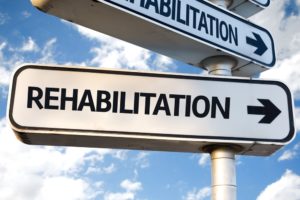Over 2 million people receive drug rehabilitation treatment each year in the United States, but millions more go without. For those who are willing and able to enter a rehabilitation program for prescription drugs, finding the right treatment regimen and facility can seem confusing. For concerned family and loved ones, there are several things to keep in mind when searching for a prescription drug rehab center.
Depending on their needs and personal circumstances, the individual seeking recovery may need an inpatient or outpatient center. Also, determining the amount of time they need to spend in the center is crucial to their recovery and prevention of relapse. Below are several issues to explore in order to discern what treatment option is best for the patient.
What do inpatient rehabilitation centers offer that outpatient programs can’t?
The main difference between inpatient and outpatient centers is time and mobility. With an inpatient treatment center, the patient is required to be on-site for a specific period. They live at the center, and it is designed as a ‘home away from home.’ The patient is given a structured schedule, with predetermined wake-up times, bedtimes, and mealtimes. During the day, they are required to attend a combination of individual and group therapy. Holistic treatment options are also available during inpatient rehab stays.
With an outpatient program, the individual attends the center on a part-time basis. They are free to come and go at scheduled times. During an outpatient regimen, the patient is scheduled to attend therapy sessions and can participate in group activities. An inpatient program can offer patients a more extensive array of treatment options, and also, detox is available if needed. Doctors and therapists are also on-call 24/7.
Determining which program to attend is predicated on several factors. First, how long and severe of an addiction are they suffering from? For those who’ve been addicted for years, or who have gotten treatment in the past but have relapsed, an inpatient treatment center is usually recommended. For those who have had short-lived addictions, or who do not have the resources to attend inpatient, outpatient programs can work for these individuals.
How long of a treatment program should someone look for?
Inpatient treatment programs can last anywhere from 28 days or up to 6 months. Outpatient programs are usually scheduled to last from 3 to 6 months, and in some cases, up to a year. Outpatient attendees participate in the program for about 10 to 12 hours per week.
Treatment plans are always customized to the individual. Those with severe addictions or comorbid conditions may require more prolonged treatment. Also, outpatient treatment is often prescribed as part of ongoing maintenance for those who’ve completed an inpatient program.
Do drug rehab centers offer pain management services?
Over 100 million people live with chronic pain in the United States. Chronic pain patients who receive prescription painkillers may be reluctant to seek treatment if they cannot adequately manage their pain while in rehabilitation. Doctors are hesitant to remove efficacious opioids from a patient’s treatment for chronic pain, and integrated approaches are made for this subset of rehabilitation patients.
Opioid replacement drugs
Psychological counseling
Non-opioid pain medications
Opioid therapy with intermittent drug testing
How are treatment medications used in rehab?
Inpatient and outpatient rehab centers give patients the advantage of having a team of medical professionals to address their unique needs. Doctors can monitor patients when prescribing medications like opioids for chronic pain patients, sleep aids for those in withdrawal, and antidepressants for patients with comorbid conditions.
What types of alternative therapies are offered in treatment?
An integrated approach to addiction treatment is a highly efficacious method for treating the disease. Addiction takes over every facet of a person’s life, infecting their physical, mental, and emotional wellbeing. Alternative therapies have been shown to help patients beat their addiction by focusing on whole-body healing.
Group sports and fitness is an excellent way for patients to build confidence and foster relationships with like-minded people who are also on the path to recovery. Many treatment centers offer outdoor sports and recreation for their patients. Reiki and massage therapy can relieve tension, stress, and pain so individuals can better focus on their recovery.
While addiction is a painful and distressing disease for the sufferer and their loved ones, drug rehab centers can help them start on the path to recovery. With support from professional drug counselors and intake specialists, individuals and their families can determine which type of treatment center is best for their unique circumstances.



























